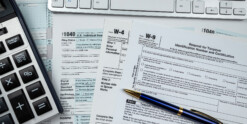In today’s economic climate, a significantly early retirement may seem like a luxury for the very wealthy. Turns out, you simply need to be prudent and smart to afford yourself an early farewell from traditional work – prudent about what you have, and smart about what you need to live comfortably.
In short form, you need to have money saved that can support your lifestyle for several decades. Take a look at the more detailed list below to see if your retirement date is in sight, or whether your retirement planning needs a little more attention first:
1. Have you reduced your consumer debt to zero? – If you’re still carrying balances on your credit cards from month to month, now is not the time to bid adieu to your coworkers. The same is true for your mortgage; you want to have that monthly expense down to zero before retiring. If your mortgage doesn’t seem to be going anywhere anytime soon, consider downsizing to a more affordable home that you can own outright more quickly.
2. Will you have cash flow during retirement? – Cash flow during retirement isn’t a luxury – it’s a necessity. Keep in mind that Social Security benefits aren’t available until age 62 at the earliest. Before then, you will need to have a money stream available to you from some other source. This could take the form of withdrawals from a 401(k) or Roth IRA, but even then you need to be smart about stretching every dollar so your reserve doesn’t deplete too quickly. Remember, retirement is about getting used to living on a fixed income. Consider this exercise: use a year while you’re working to live only on the income you plan to have during retirement. This is a great way to track your cash flow and monitor your spending, so you’re more knowledgeable about how much you’ll really need annually in retirement.
3. Do you know how your expenses may change? – Go ahead and scratch commuting costs and your daily lattes off the expense list (maybe). But consider the expenses you may pick up in retirement. For example, a lot of retirees want the option of travel to be a part of their retirement life. Others pick up new and interesting hobbies that create additional expense. Your retirement budget will need to encompass all of the usual bills while making room for new expenses for the new experiences you want to have.
4. Do you have retirement health insurance? – We all know health insurance isn’t cheap. Medicare, the primary health insurance of retirees, doesn’t kick in until age 65. So until then, you’ll have to fund your own health insurance. Research your options ahead of time to avoid sticker shock when it’s time to buy. If you are leaving a traditional job with health benefits, COBRA is one option to continue your employer-sponsored coverage. But the costs to you may be sky-high compared to what you were paying while working, and the coverage only lasts 18 months after your last date of employment. Married couples where only one spouse plans to retire could look to getting coverage through the working spouse’s plan. Your state’s health care exchanges through the Affordable Care Act are another option. Remember that after retirement, your income will be lower, which may qualify you for tax credits to help offset what you’ll be paying in premiums.
5. Have you adjusted your portfolio? – Stepping out into early retirement changes the level of risk your portfolio can handle. As you near retirement, it’s important to revisit your risk tolerance and update your asset allocation accordingly. For example, some early retirees have portfolios that are stock heavy. This is fine when you’re still working and can contribute to a down market. But having all your assets in stocks is something that needs to be rebalanced after retirement. The same is true for bond-heavy portfolios – you need stocks for growth, so it’s imperative to achieve a nice balance before retirement kicks in.
6. Do you have financial freedom? – A simple calculation to gauge whether you’re ready for early retirement is to take your investable assets and divide this number by your annual expense. If this ratio is above 25, that means you’re in pretty good shape. You can utilize the 4 percent rule to withdraw from your portfolio, and chances are good that your money will last 30 years or more.













